Organisational Behaviour Report: Volkswagen Group's Practices
VerifiedAdded on 2023/01/12
|16
|4814
|53
Report
AI Summary
This report provides a comprehensive analysis of organisational behaviour within the Volkswagen Group. It begins with an introduction to organisational behaviour, defining its key components and significance within a business context. The report then delves into the impact of organisational culture, power, and politics on individual and team behaviour, using Handy's model of organisational culture to assess the influence of power, role, task, and person cultures. Furthermore, it explores various motivational theories and techniques, categorizing them into content and process theories, with a specific focus on Maslow's Hierarchy of Needs and Vroom's Expectancy Theory. The report also compares effective and ineffective teams, highlighting the characteristics that contribute to team success and failure. Finally, the report examines different concepts and philosophies of organisational behaviour as applied by Volkswagen, providing a holistic view of how the company manages its workforce and fosters a productive work environment.
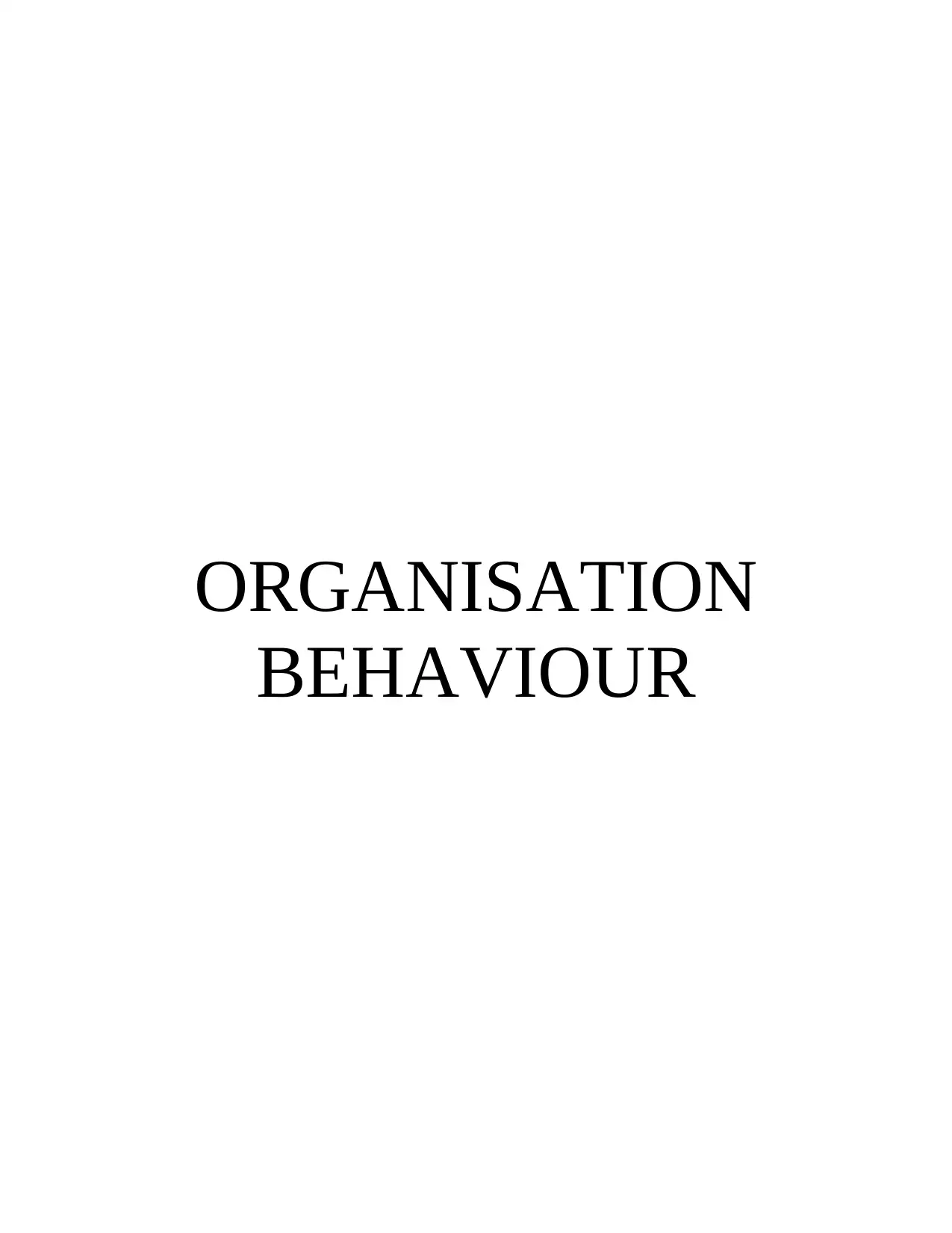
ORGANISATION
BEHAVIOUR
BEHAVIOUR
Paraphrase This Document
Need a fresh take? Get an instant paraphrase of this document with our AI Paraphraser
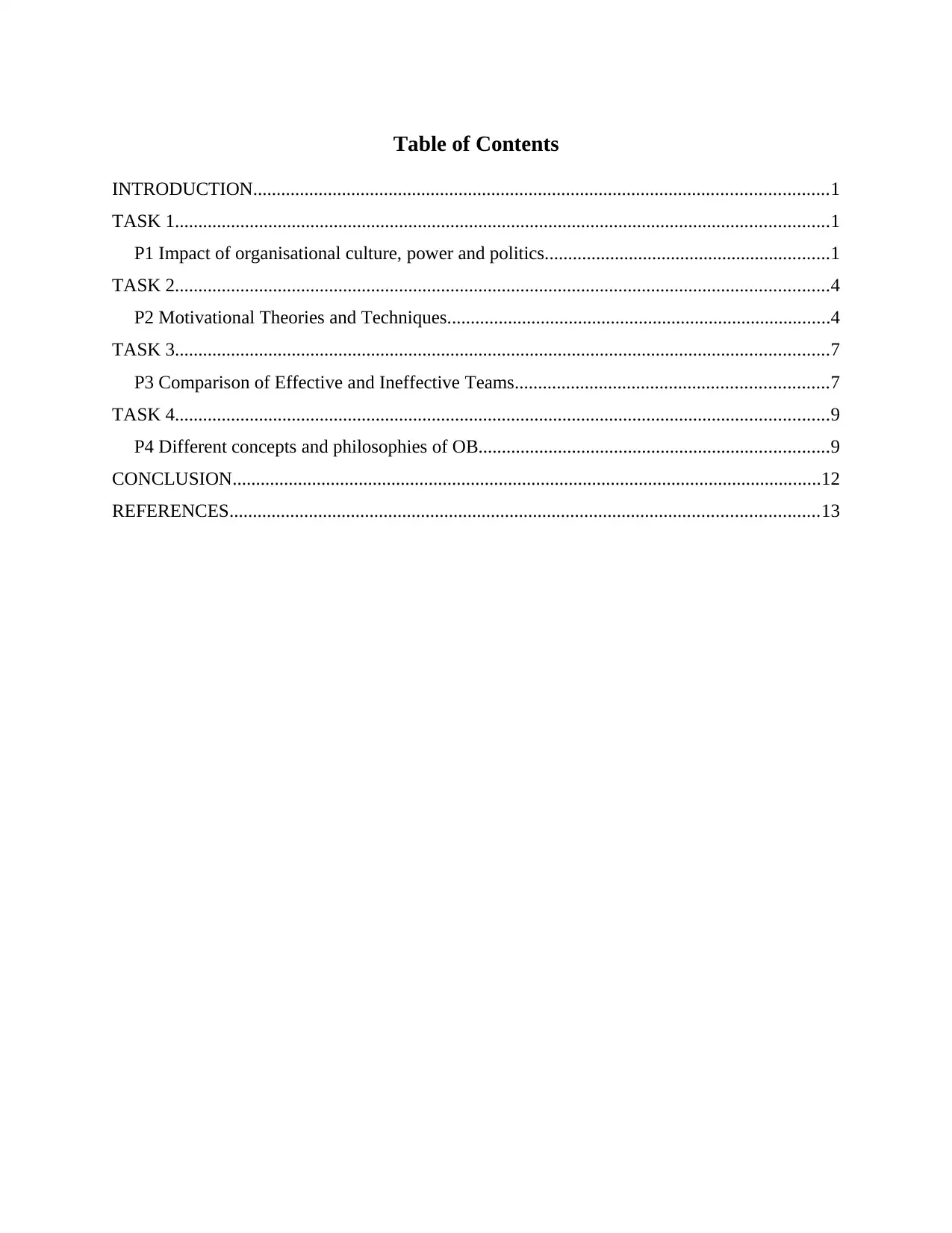
Table of Contents
INTRODUCTION...........................................................................................................................1
TASK 1............................................................................................................................................1
P1 Impact of organisational culture, power and politics.............................................................1
TASK 2............................................................................................................................................4
P2 Motivational Theories and Techniques..................................................................................4
TASK 3............................................................................................................................................7
P3 Comparison of Effective and Ineffective Teams...................................................................7
TASK 4............................................................................................................................................9
P4 Different concepts and philosophies of OB...........................................................................9
CONCLUSION..............................................................................................................................12
REFERENCES..............................................................................................................................13
INTRODUCTION...........................................................................................................................1
TASK 1............................................................................................................................................1
P1 Impact of organisational culture, power and politics.............................................................1
TASK 2............................................................................................................................................4
P2 Motivational Theories and Techniques..................................................................................4
TASK 3............................................................................................................................................7
P3 Comparison of Effective and Ineffective Teams...................................................................7
TASK 4............................................................................................................................................9
P4 Different concepts and philosophies of OB...........................................................................9
CONCLUSION..............................................................................................................................12
REFERENCES..............................................................................................................................13
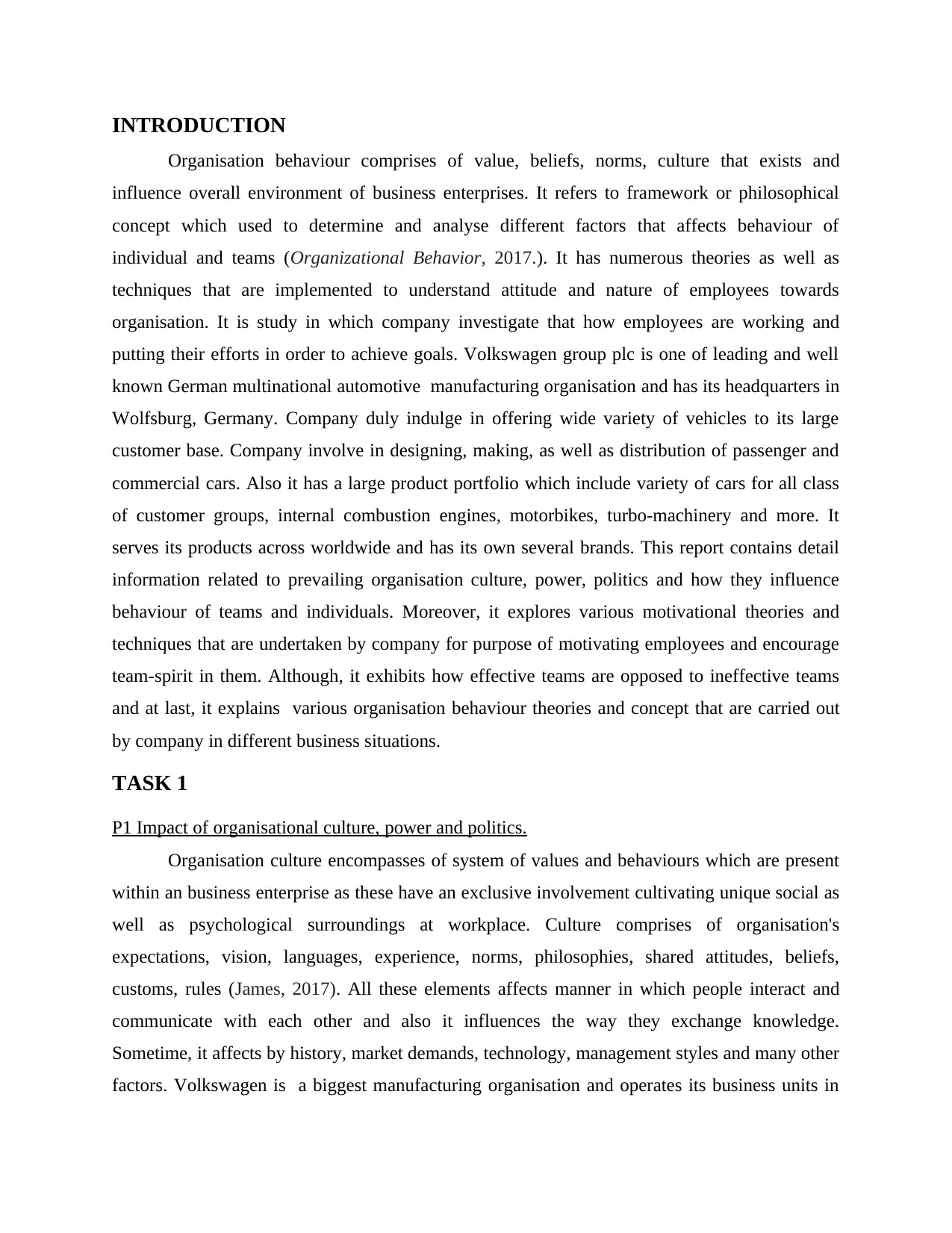
INTRODUCTION
Organisation behaviour comprises of value, beliefs, norms, culture that exists and
influence overall environment of business enterprises. It refers to framework or philosophical
concept which used to determine and analyse different factors that affects behaviour of
individual and teams (Organizational Behavior, 2017.). It has numerous theories as well as
techniques that are implemented to understand attitude and nature of employees towards
organisation. It is study in which company investigate that how employees are working and
putting their efforts in order to achieve goals. Volkswagen group plc is one of leading and well
known German multinational automotive manufacturing organisation and has its headquarters in
Wolfsburg, Germany. Company duly indulge in offering wide variety of vehicles to its large
customer base. Company involve in designing, making, as well as distribution of passenger and
commercial cars. Also it has a large product portfolio which include variety of cars for all class
of customer groups, internal combustion engines, motorbikes, turbo-machinery and more. It
serves its products across worldwide and has its own several brands. This report contains detail
information related to prevailing organisation culture, power, politics and how they influence
behaviour of teams and individuals. Moreover, it explores various motivational theories and
techniques that are undertaken by company for purpose of motivating employees and encourage
team-spirit in them. Although, it exhibits how effective teams are opposed to ineffective teams
and at last, it explains various organisation behaviour theories and concept that are carried out
by company in different business situations.
TASK 1
P1 Impact of organisational culture, power and politics.
Organisation culture encompasses of system of values and behaviours which are present
within an business enterprise as these have an exclusive involvement cultivating unique social as
well as psychological surroundings at workplace. Culture comprises of organisation's
expectations, vision, languages, experience, norms, philosophies, shared attitudes, beliefs,
customs, rules (James, 2017). All these elements affects manner in which people interact and
communicate with each other and also it influences the way they exchange knowledge.
Sometime, it affects by history, market demands, technology, management styles and many other
factors. Volkswagen is a biggest manufacturing organisation and operates its business units in
Organisation behaviour comprises of value, beliefs, norms, culture that exists and
influence overall environment of business enterprises. It refers to framework or philosophical
concept which used to determine and analyse different factors that affects behaviour of
individual and teams (Organizational Behavior, 2017.). It has numerous theories as well as
techniques that are implemented to understand attitude and nature of employees towards
organisation. It is study in which company investigate that how employees are working and
putting their efforts in order to achieve goals. Volkswagen group plc is one of leading and well
known German multinational automotive manufacturing organisation and has its headquarters in
Wolfsburg, Germany. Company duly indulge in offering wide variety of vehicles to its large
customer base. Company involve in designing, making, as well as distribution of passenger and
commercial cars. Also it has a large product portfolio which include variety of cars for all class
of customer groups, internal combustion engines, motorbikes, turbo-machinery and more. It
serves its products across worldwide and has its own several brands. This report contains detail
information related to prevailing organisation culture, power, politics and how they influence
behaviour of teams and individuals. Moreover, it explores various motivational theories and
techniques that are undertaken by company for purpose of motivating employees and encourage
team-spirit in them. Although, it exhibits how effective teams are opposed to ineffective teams
and at last, it explains various organisation behaviour theories and concept that are carried out
by company in different business situations.
TASK 1
P1 Impact of organisational culture, power and politics.
Organisation culture encompasses of system of values and behaviours which are present
within an business enterprise as these have an exclusive involvement cultivating unique social as
well as psychological surroundings at workplace. Culture comprises of organisation's
expectations, vision, languages, experience, norms, philosophies, shared attitudes, beliefs,
customs, rules (James, 2017). All these elements affects manner in which people interact and
communicate with each other and also it influences the way they exchange knowledge.
Sometime, it affects by history, market demands, technology, management styles and many other
factors. Volkswagen is a biggest manufacturing organisation and operates its business units in
⊘ This is a preview!⊘
Do you want full access?
Subscribe today to unlock all pages.

Trusted by 1+ million students worldwide
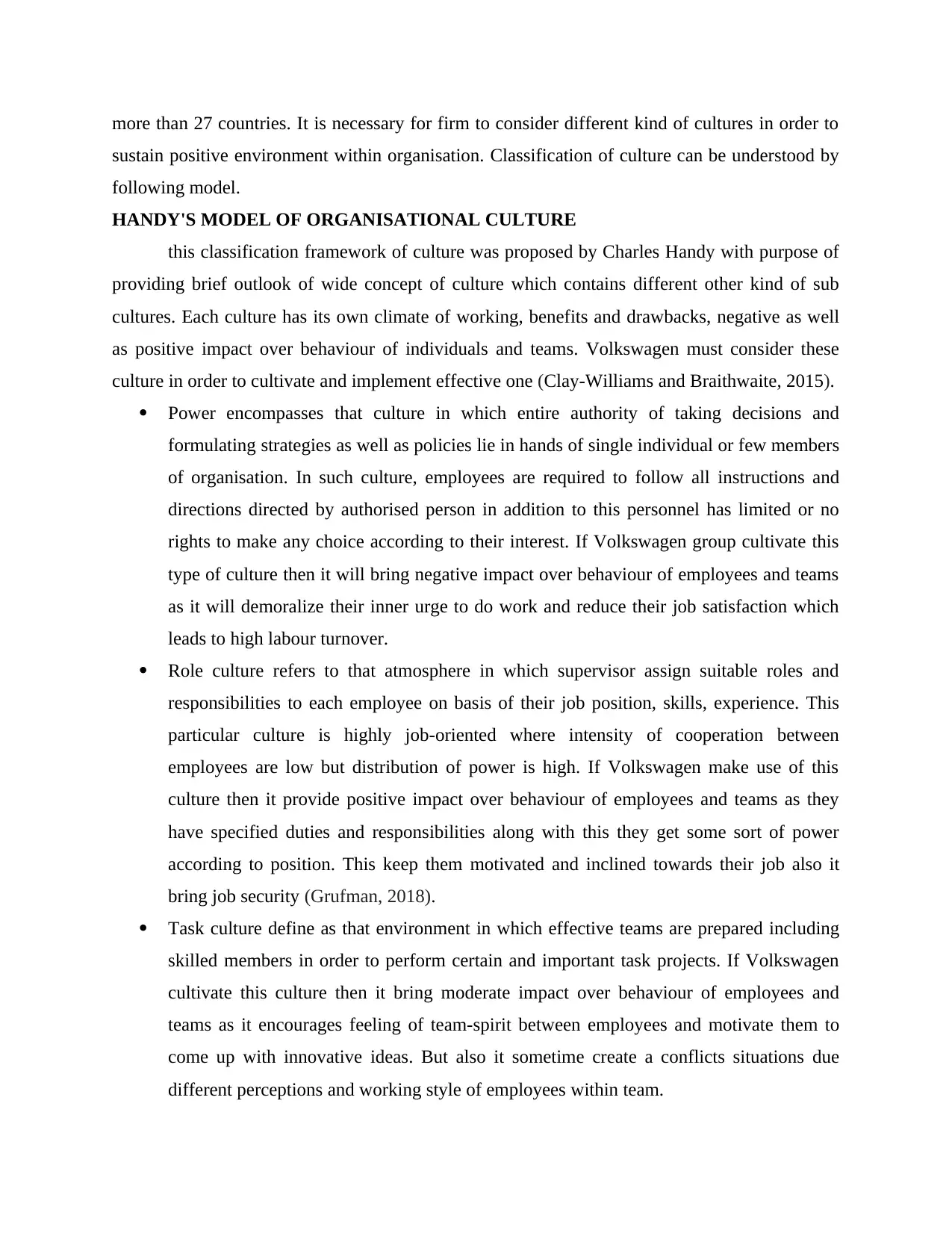
more than 27 countries. It is necessary for firm to consider different kind of cultures in order to
sustain positive environment within organisation. Classification of culture can be understood by
following model.
HANDY'S MODEL OF ORGANISATIONAL CULTURE
this classification framework of culture was proposed by Charles Handy with purpose of
providing brief outlook of wide concept of culture which contains different other kind of sub
cultures. Each culture has its own climate of working, benefits and drawbacks, negative as well
as positive impact over behaviour of individuals and teams. Volkswagen must consider these
culture in order to cultivate and implement effective one (Clay-Williams and Braithwaite, 2015).
Power encompasses that culture in which entire authority of taking decisions and
formulating strategies as well as policies lie in hands of single individual or few members
of organisation. In such culture, employees are required to follow all instructions and
directions directed by authorised person in addition to this personnel has limited or no
rights to make any choice according to their interest. If Volkswagen group cultivate this
type of culture then it will bring negative impact over behaviour of employees and teams
as it will demoralize their inner urge to do work and reduce their job satisfaction which
leads to high labour turnover.
Role culture refers to that atmosphere in which supervisor assign suitable roles and
responsibilities to each employee on basis of their job position, skills, experience. This
particular culture is highly job-oriented where intensity of cooperation between
employees are low but distribution of power is high. If Volkswagen make use of this
culture then it provide positive impact over behaviour of employees and teams as they
have specified duties and responsibilities along with this they get some sort of power
according to position. This keep them motivated and inclined towards their job also it
bring job security (Grufman, 2018).
Task culture define as that environment in which effective teams are prepared including
skilled members in order to perform certain and important task projects. If Volkswagen
cultivate this culture then it bring moderate impact over behaviour of employees and
teams as it encourages feeling of team-spirit between employees and motivate them to
come up with innovative ideas. But also it sometime create a conflicts situations due
different perceptions and working style of employees within team.
sustain positive environment within organisation. Classification of culture can be understood by
following model.
HANDY'S MODEL OF ORGANISATIONAL CULTURE
this classification framework of culture was proposed by Charles Handy with purpose of
providing brief outlook of wide concept of culture which contains different other kind of sub
cultures. Each culture has its own climate of working, benefits and drawbacks, negative as well
as positive impact over behaviour of individuals and teams. Volkswagen must consider these
culture in order to cultivate and implement effective one (Clay-Williams and Braithwaite, 2015).
Power encompasses that culture in which entire authority of taking decisions and
formulating strategies as well as policies lie in hands of single individual or few members
of organisation. In such culture, employees are required to follow all instructions and
directions directed by authorised person in addition to this personnel has limited or no
rights to make any choice according to their interest. If Volkswagen group cultivate this
type of culture then it will bring negative impact over behaviour of employees and teams
as it will demoralize their inner urge to do work and reduce their job satisfaction which
leads to high labour turnover.
Role culture refers to that atmosphere in which supervisor assign suitable roles and
responsibilities to each employee on basis of their job position, skills, experience. This
particular culture is highly job-oriented where intensity of cooperation between
employees are low but distribution of power is high. If Volkswagen make use of this
culture then it provide positive impact over behaviour of employees and teams as they
have specified duties and responsibilities along with this they get some sort of power
according to position. This keep them motivated and inclined towards their job also it
bring job security (Grufman, 2018).
Task culture define as that environment in which effective teams are prepared including
skilled members in order to perform certain and important task projects. If Volkswagen
cultivate this culture then it bring moderate impact over behaviour of employees and
teams as it encourages feeling of team-spirit between employees and motivate them to
come up with innovative ideas. But also it sometime create a conflicts situations due
different perceptions and working style of employees within team.
Paraphrase This Document
Need a fresh take? Get an instant paraphrase of this document with our AI Paraphraser
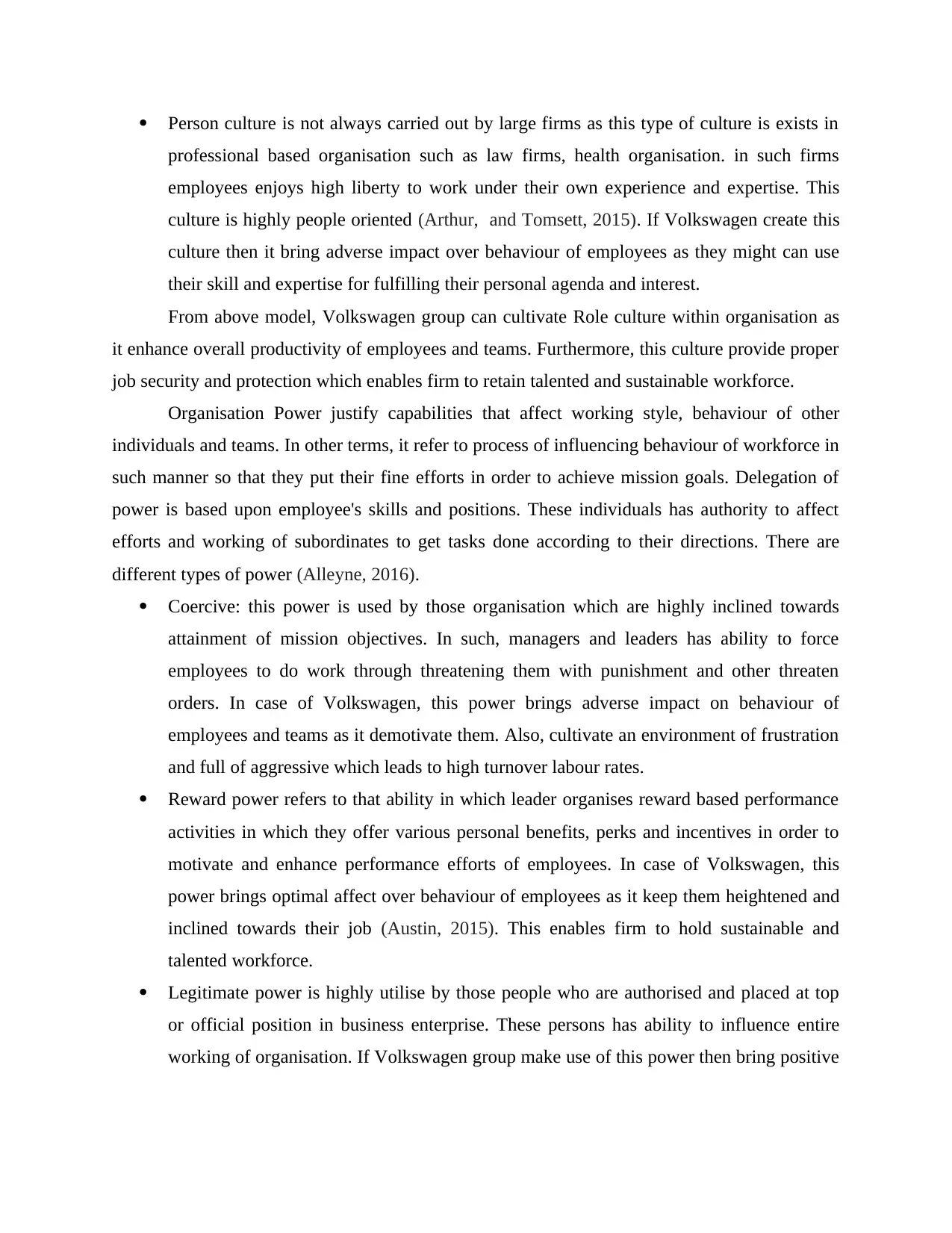
Person culture is not always carried out by large firms as this type of culture is exists in
professional based organisation such as law firms, health organisation. in such firms
employees enjoys high liberty to work under their own experience and expertise. This
culture is highly people oriented (Arthur, and Tomsett, 2015). If Volkswagen create this
culture then it bring adverse impact over behaviour of employees as they might can use
their skill and expertise for fulfilling their personal agenda and interest.
From above model, Volkswagen group can cultivate Role culture within organisation as
it enhance overall productivity of employees and teams. Furthermore, this culture provide proper
job security and protection which enables firm to retain talented and sustainable workforce.
Organisation Power justify capabilities that affect working style, behaviour of other
individuals and teams. In other terms, it refer to process of influencing behaviour of workforce in
such manner so that they put their fine efforts in order to achieve mission goals. Delegation of
power is based upon employee's skills and positions. These individuals has authority to affect
efforts and working of subordinates to get tasks done according to their directions. There are
different types of power (Alleyne, 2016).
Coercive: this power is used by those organisation which are highly inclined towards
attainment of mission objectives. In such, managers and leaders has ability to force
employees to do work through threatening them with punishment and other threaten
orders. In case of Volkswagen, this power brings adverse impact on behaviour of
employees and teams as it demotivate them. Also, cultivate an environment of frustration
and full of aggressive which leads to high turnover labour rates.
Reward power refers to that ability in which leader organises reward based performance
activities in which they offer various personal benefits, perks and incentives in order to
motivate and enhance performance efforts of employees. In case of Volkswagen, this
power brings optimal affect over behaviour of employees as it keep them heightened and
inclined towards their job (Austin, 2015). This enables firm to hold sustainable and
talented workforce.
Legitimate power is highly utilise by those people who are authorised and placed at top
or official position in business enterprise. These persons has ability to influence entire
working of organisation. If Volkswagen group make use of this power then bring positive
professional based organisation such as law firms, health organisation. in such firms
employees enjoys high liberty to work under their own experience and expertise. This
culture is highly people oriented (Arthur, and Tomsett, 2015). If Volkswagen create this
culture then it bring adverse impact over behaviour of employees as they might can use
their skill and expertise for fulfilling their personal agenda and interest.
From above model, Volkswagen group can cultivate Role culture within organisation as
it enhance overall productivity of employees and teams. Furthermore, this culture provide proper
job security and protection which enables firm to retain talented and sustainable workforce.
Organisation Power justify capabilities that affect working style, behaviour of other
individuals and teams. In other terms, it refer to process of influencing behaviour of workforce in
such manner so that they put their fine efforts in order to achieve mission goals. Delegation of
power is based upon employee's skills and positions. These individuals has authority to affect
efforts and working of subordinates to get tasks done according to their directions. There are
different types of power (Alleyne, 2016).
Coercive: this power is used by those organisation which are highly inclined towards
attainment of mission objectives. In such, managers and leaders has ability to force
employees to do work through threatening them with punishment and other threaten
orders. In case of Volkswagen, this power brings adverse impact on behaviour of
employees and teams as it demotivate them. Also, cultivate an environment of frustration
and full of aggressive which leads to high turnover labour rates.
Reward power refers to that ability in which leader organises reward based performance
activities in which they offer various personal benefits, perks and incentives in order to
motivate and enhance performance efforts of employees. In case of Volkswagen, this
power brings optimal affect over behaviour of employees as it keep them heightened and
inclined towards their job (Austin, 2015). This enables firm to hold sustainable and
talented workforce.
Legitimate power is highly utilise by those people who are authorised and placed at top
or official position in business enterprise. These persons has ability to influence entire
working of organisation. If Volkswagen group make use of this power then bring positive
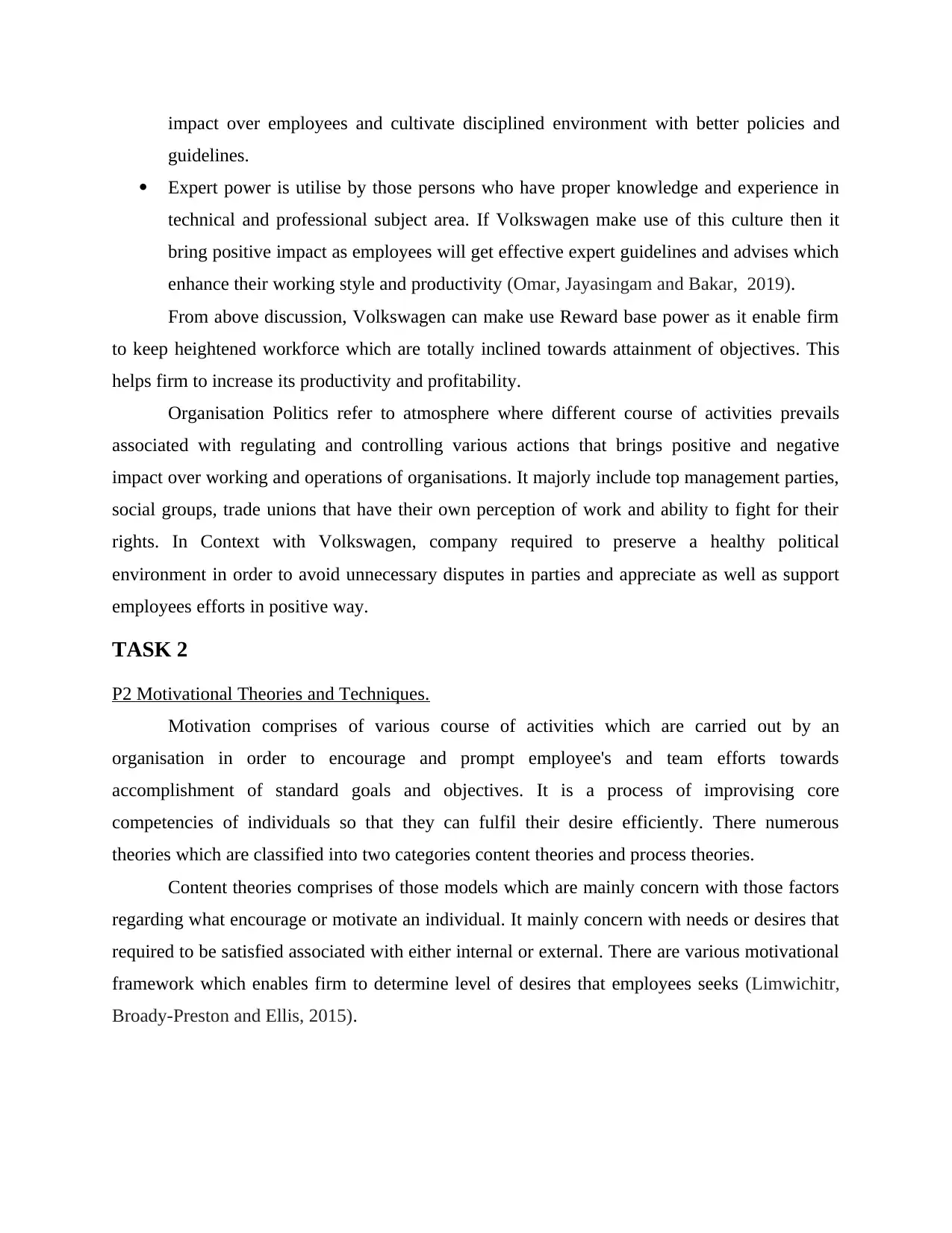
impact over employees and cultivate disciplined environment with better policies and
guidelines.
Expert power is utilise by those persons who have proper knowledge and experience in
technical and professional subject area. If Volkswagen make use of this culture then it
bring positive impact as employees will get effective expert guidelines and advises which
enhance their working style and productivity (Omar, Jayasingam and Bakar, 2019).
From above discussion, Volkswagen can make use Reward base power as it enable firm
to keep heightened workforce which are totally inclined towards attainment of objectives. This
helps firm to increase its productivity and profitability.
Organisation Politics refer to atmosphere where different course of activities prevails
associated with regulating and controlling various actions that brings positive and negative
impact over working and operations of organisations. It majorly include top management parties,
social groups, trade unions that have their own perception of work and ability to fight for their
rights. In Context with Volkswagen, company required to preserve a healthy political
environment in order to avoid unnecessary disputes in parties and appreciate as well as support
employees efforts in positive way.
TASK 2
P2 Motivational Theories and Techniques.
Motivation comprises of various course of activities which are carried out by an
organisation in order to encourage and prompt employee's and team efforts towards
accomplishment of standard goals and objectives. It is a process of improvising core
competencies of individuals so that they can fulfil their desire efficiently. There numerous
theories which are classified into two categories content theories and process theories.
Content theories comprises of those models which are mainly concern with those factors
regarding what encourage or motivate an individual. It mainly concern with needs or desires that
required to be satisfied associated with either internal or external. There are various motivational
framework which enables firm to determine level of desires that employees seeks (Limwichitr,
Broady-Preston and Ellis, 2015).
guidelines.
Expert power is utilise by those persons who have proper knowledge and experience in
technical and professional subject area. If Volkswagen make use of this culture then it
bring positive impact as employees will get effective expert guidelines and advises which
enhance their working style and productivity (Omar, Jayasingam and Bakar, 2019).
From above discussion, Volkswagen can make use Reward base power as it enable firm
to keep heightened workforce which are totally inclined towards attainment of objectives. This
helps firm to increase its productivity and profitability.
Organisation Politics refer to atmosphere where different course of activities prevails
associated with regulating and controlling various actions that brings positive and negative
impact over working and operations of organisations. It majorly include top management parties,
social groups, trade unions that have their own perception of work and ability to fight for their
rights. In Context with Volkswagen, company required to preserve a healthy political
environment in order to avoid unnecessary disputes in parties and appreciate as well as support
employees efforts in positive way.
TASK 2
P2 Motivational Theories and Techniques.
Motivation comprises of various course of activities which are carried out by an
organisation in order to encourage and prompt employee's and team efforts towards
accomplishment of standard goals and objectives. It is a process of improvising core
competencies of individuals so that they can fulfil their desire efficiently. There numerous
theories which are classified into two categories content theories and process theories.
Content theories comprises of those models which are mainly concern with those factors
regarding what encourage or motivate an individual. It mainly concern with needs or desires that
required to be satisfied associated with either internal or external. There are various motivational
framework which enables firm to determine level of desires that employees seeks (Limwichitr,
Broady-Preston and Ellis, 2015).
⊘ This is a preview!⊘
Do you want full access?
Subscribe today to unlock all pages.

Trusted by 1+ million students worldwide
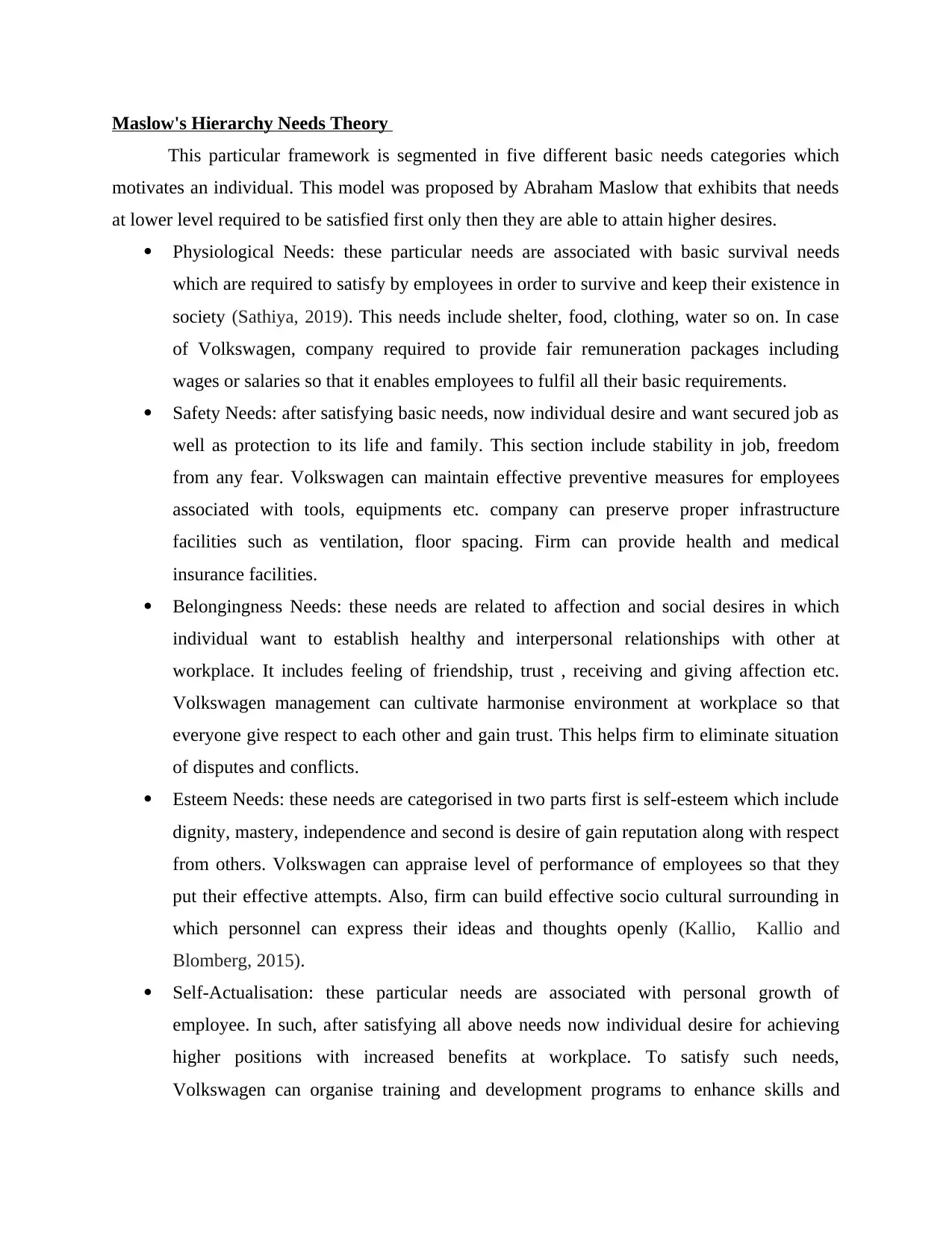
Maslow's Hierarchy Needs Theory
This particular framework is segmented in five different basic needs categories which
motivates an individual. This model was proposed by Abraham Maslow that exhibits that needs
at lower level required to be satisfied first only then they are able to attain higher desires.
Physiological Needs: these particular needs are associated with basic survival needs
which are required to satisfy by employees in order to survive and keep their existence in
society (Sathiya, 2019). This needs include shelter, food, clothing, water so on. In case
of Volkswagen, company required to provide fair remuneration packages including
wages or salaries so that it enables employees to fulfil all their basic requirements.
Safety Needs: after satisfying basic needs, now individual desire and want secured job as
well as protection to its life and family. This section include stability in job, freedom
from any fear. Volkswagen can maintain effective preventive measures for employees
associated with tools, equipments etc. company can preserve proper infrastructure
facilities such as ventilation, floor spacing. Firm can provide health and medical
insurance facilities.
Belongingness Needs: these needs are related to affection and social desires in which
individual want to establish healthy and interpersonal relationships with other at
workplace. It includes feeling of friendship, trust , receiving and giving affection etc.
Volkswagen management can cultivate harmonise environment at workplace so that
everyone give respect to each other and gain trust. This helps firm to eliminate situation
of disputes and conflicts.
Esteem Needs: these needs are categorised in two parts first is self-esteem which include
dignity, mastery, independence and second is desire of gain reputation along with respect
from others. Volkswagen can appraise level of performance of employees so that they
put their effective attempts. Also, firm can build effective socio cultural surrounding in
which personnel can express their ideas and thoughts openly (Kallio, Kallio and
Blomberg, 2015).
Self-Actualisation: these particular needs are associated with personal growth of
employee. In such, after satisfying all above needs now individual desire for achieving
higher positions with increased benefits at workplace. To satisfy such needs,
Volkswagen can organise training and development programs to enhance skills and
This particular framework is segmented in five different basic needs categories which
motivates an individual. This model was proposed by Abraham Maslow that exhibits that needs
at lower level required to be satisfied first only then they are able to attain higher desires.
Physiological Needs: these particular needs are associated with basic survival needs
which are required to satisfy by employees in order to survive and keep their existence in
society (Sathiya, 2019). This needs include shelter, food, clothing, water so on. In case
of Volkswagen, company required to provide fair remuneration packages including
wages or salaries so that it enables employees to fulfil all their basic requirements.
Safety Needs: after satisfying basic needs, now individual desire and want secured job as
well as protection to its life and family. This section include stability in job, freedom
from any fear. Volkswagen can maintain effective preventive measures for employees
associated with tools, equipments etc. company can preserve proper infrastructure
facilities such as ventilation, floor spacing. Firm can provide health and medical
insurance facilities.
Belongingness Needs: these needs are related to affection and social desires in which
individual want to establish healthy and interpersonal relationships with other at
workplace. It includes feeling of friendship, trust , receiving and giving affection etc.
Volkswagen management can cultivate harmonise environment at workplace so that
everyone give respect to each other and gain trust. This helps firm to eliminate situation
of disputes and conflicts.
Esteem Needs: these needs are categorised in two parts first is self-esteem which include
dignity, mastery, independence and second is desire of gain reputation along with respect
from others. Volkswagen can appraise level of performance of employees so that they
put their effective attempts. Also, firm can build effective socio cultural surrounding in
which personnel can express their ideas and thoughts openly (Kallio, Kallio and
Blomberg, 2015).
Self-Actualisation: these particular needs are associated with personal growth of
employee. In such, after satisfying all above needs now individual desire for achieving
higher positions with increased benefits at workplace. To satisfy such needs,
Volkswagen can organise training and development programs to enhance skills and
Paraphrase This Document
Need a fresh take? Get an instant paraphrase of this document with our AI Paraphraser
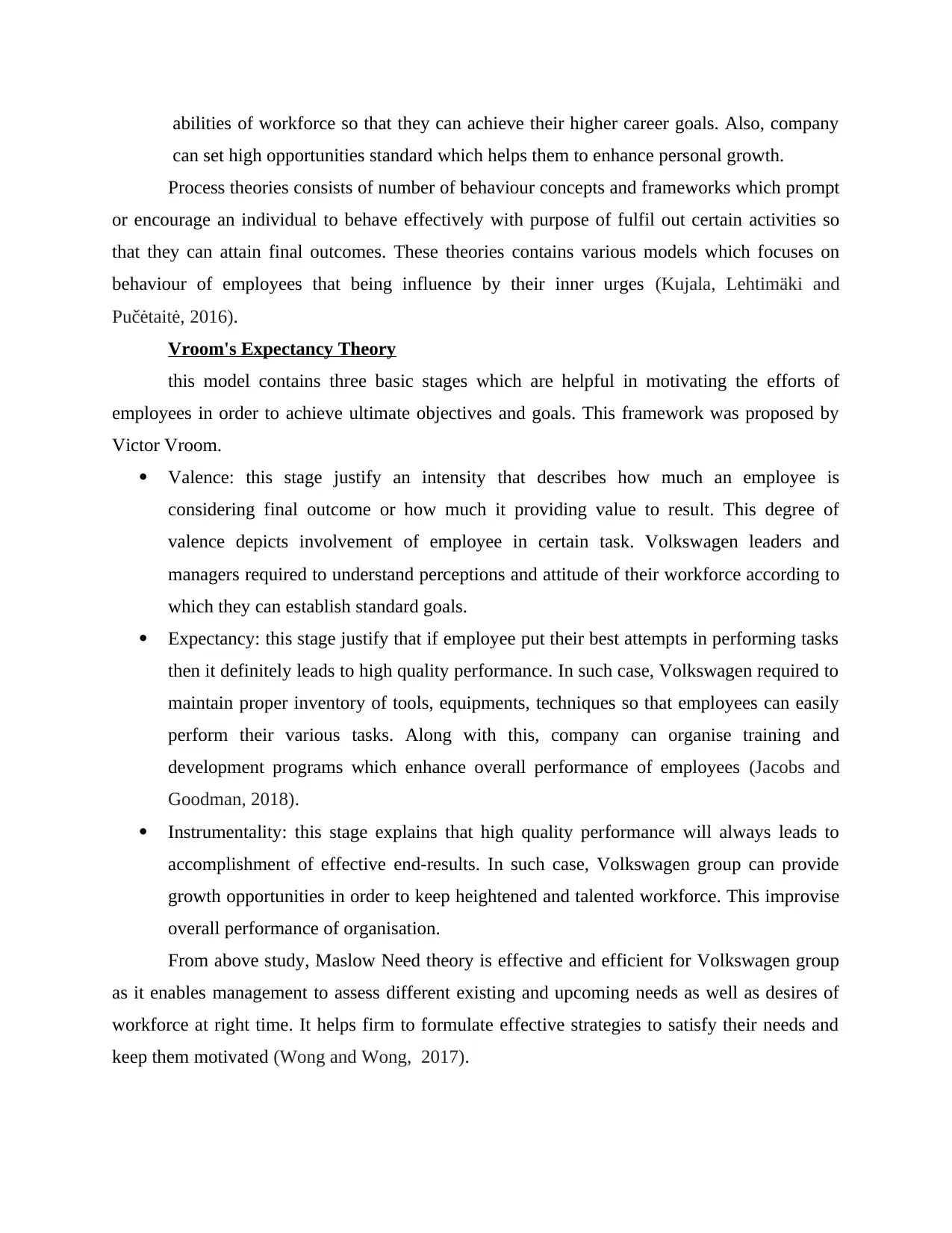
abilities of workforce so that they can achieve their higher career goals. Also, company
can set high opportunities standard which helps them to enhance personal growth.
Process theories consists of number of behaviour concepts and frameworks which prompt
or encourage an individual to behave effectively with purpose of fulfil out certain activities so
that they can attain final outcomes. These theories contains various models which focuses on
behaviour of employees that being influence by their inner urges (Kujala, Lehtimäki and
Pučėtaitė, 2016).
Vroom's Expectancy Theory
this model contains three basic stages which are helpful in motivating the efforts of
employees in order to achieve ultimate objectives and goals. This framework was proposed by
Victor Vroom.
Valence: this stage justify an intensity that describes how much an employee is
considering final outcome or how much it providing value to result. This degree of
valence depicts involvement of employee in certain task. Volkswagen leaders and
managers required to understand perceptions and attitude of their workforce according to
which they can establish standard goals.
Expectancy: this stage justify that if employee put their best attempts in performing tasks
then it definitely leads to high quality performance. In such case, Volkswagen required to
maintain proper inventory of tools, equipments, techniques so that employees can easily
perform their various tasks. Along with this, company can organise training and
development programs which enhance overall performance of employees (Jacobs and
Goodman, 2018).
Instrumentality: this stage explains that high quality performance will always leads to
accomplishment of effective end-results. In such case, Volkswagen group can provide
growth opportunities in order to keep heightened and talented workforce. This improvise
overall performance of organisation.
From above study, Maslow Need theory is effective and efficient for Volkswagen group
as it enables management to assess different existing and upcoming needs as well as desires of
workforce at right time. It helps firm to formulate effective strategies to satisfy their needs and
keep them motivated (Wong and Wong, 2017).
can set high opportunities standard which helps them to enhance personal growth.
Process theories consists of number of behaviour concepts and frameworks which prompt
or encourage an individual to behave effectively with purpose of fulfil out certain activities so
that they can attain final outcomes. These theories contains various models which focuses on
behaviour of employees that being influence by their inner urges (Kujala, Lehtimäki and
Pučėtaitė, 2016).
Vroom's Expectancy Theory
this model contains three basic stages which are helpful in motivating the efforts of
employees in order to achieve ultimate objectives and goals. This framework was proposed by
Victor Vroom.
Valence: this stage justify an intensity that describes how much an employee is
considering final outcome or how much it providing value to result. This degree of
valence depicts involvement of employee in certain task. Volkswagen leaders and
managers required to understand perceptions and attitude of their workforce according to
which they can establish standard goals.
Expectancy: this stage justify that if employee put their best attempts in performing tasks
then it definitely leads to high quality performance. In such case, Volkswagen required to
maintain proper inventory of tools, equipments, techniques so that employees can easily
perform their various tasks. Along with this, company can organise training and
development programs which enhance overall performance of employees (Jacobs and
Goodman, 2018).
Instrumentality: this stage explains that high quality performance will always leads to
accomplishment of effective end-results. In such case, Volkswagen group can provide
growth opportunities in order to keep heightened and talented workforce. This improvise
overall performance of organisation.
From above study, Maslow Need theory is effective and efficient for Volkswagen group
as it enables management to assess different existing and upcoming needs as well as desires of
workforce at right time. It helps firm to formulate effective strategies to satisfy their needs and
keep them motivated (Wong and Wong, 2017).
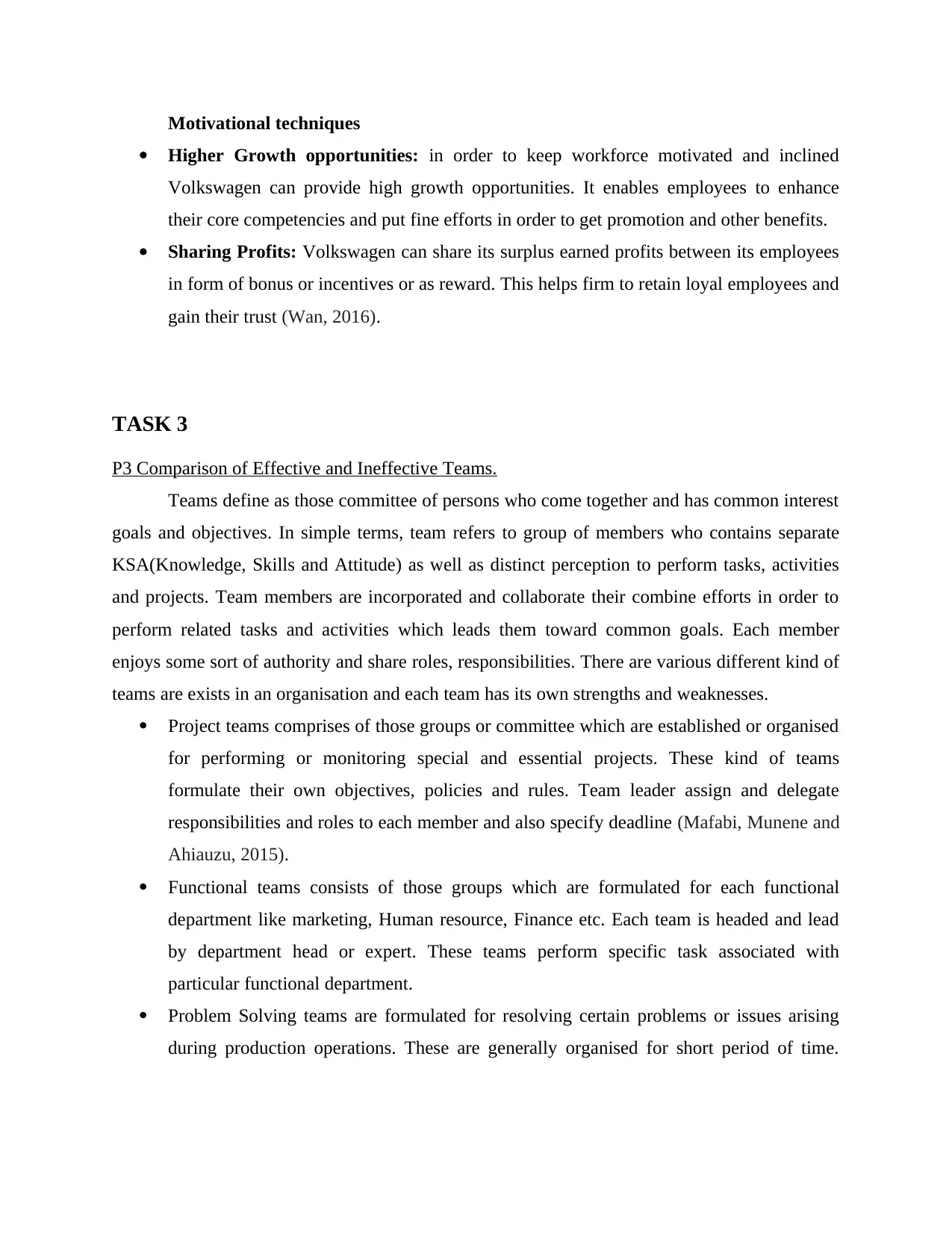
Motivational techniques
Higher Growth opportunities: in order to keep workforce motivated and inclined
Volkswagen can provide high growth opportunities. It enables employees to enhance
their core competencies and put fine efforts in order to get promotion and other benefits.
Sharing Profits: Volkswagen can share its surplus earned profits between its employees
in form of bonus or incentives or as reward. This helps firm to retain loyal employees and
gain their trust (Wan, 2016).
TASK 3
P3 Comparison of Effective and Ineffective Teams.
Teams define as those committee of persons who come together and has common interest
goals and objectives. In simple terms, team refers to group of members who contains separate
KSA(Knowledge, Skills and Attitude) as well as distinct perception to perform tasks, activities
and projects. Team members are incorporated and collaborate their combine efforts in order to
perform related tasks and activities which leads them toward common goals. Each member
enjoys some sort of authority and share roles, responsibilities. There are various different kind of
teams are exists in an organisation and each team has its own strengths and weaknesses.
Project teams comprises of those groups or committee which are established or organised
for performing or monitoring special and essential projects. These kind of teams
formulate their own objectives, policies and rules. Team leader assign and delegate
responsibilities and roles to each member and also specify deadline (Mafabi, Munene and
Ahiauzu, 2015).
Functional teams consists of those groups which are formulated for each functional
department like marketing, Human resource, Finance etc. Each team is headed and lead
by department head or expert. These teams perform specific task associated with
particular functional department.
Problem Solving teams are formulated for resolving certain problems or issues arising
during production operations. These are generally organised for short period of time.
Higher Growth opportunities: in order to keep workforce motivated and inclined
Volkswagen can provide high growth opportunities. It enables employees to enhance
their core competencies and put fine efforts in order to get promotion and other benefits.
Sharing Profits: Volkswagen can share its surplus earned profits between its employees
in form of bonus or incentives or as reward. This helps firm to retain loyal employees and
gain their trust (Wan, 2016).
TASK 3
P3 Comparison of Effective and Ineffective Teams.
Teams define as those committee of persons who come together and has common interest
goals and objectives. In simple terms, team refers to group of members who contains separate
KSA(Knowledge, Skills and Attitude) as well as distinct perception to perform tasks, activities
and projects. Team members are incorporated and collaborate their combine efforts in order to
perform related tasks and activities which leads them toward common goals. Each member
enjoys some sort of authority and share roles, responsibilities. There are various different kind of
teams are exists in an organisation and each team has its own strengths and weaknesses.
Project teams comprises of those groups or committee which are established or organised
for performing or monitoring special and essential projects. These kind of teams
formulate their own objectives, policies and rules. Team leader assign and delegate
responsibilities and roles to each member and also specify deadline (Mafabi, Munene and
Ahiauzu, 2015).
Functional teams consists of those groups which are formulated for each functional
department like marketing, Human resource, Finance etc. Each team is headed and lead
by department head or expert. These teams perform specific task associated with
particular functional department.
Problem Solving teams are formulated for resolving certain problems or issues arising
during production operations. These are generally organised for short period of time.
⊘ This is a preview!⊘
Do you want full access?
Subscribe today to unlock all pages.

Trusted by 1+ million students worldwide
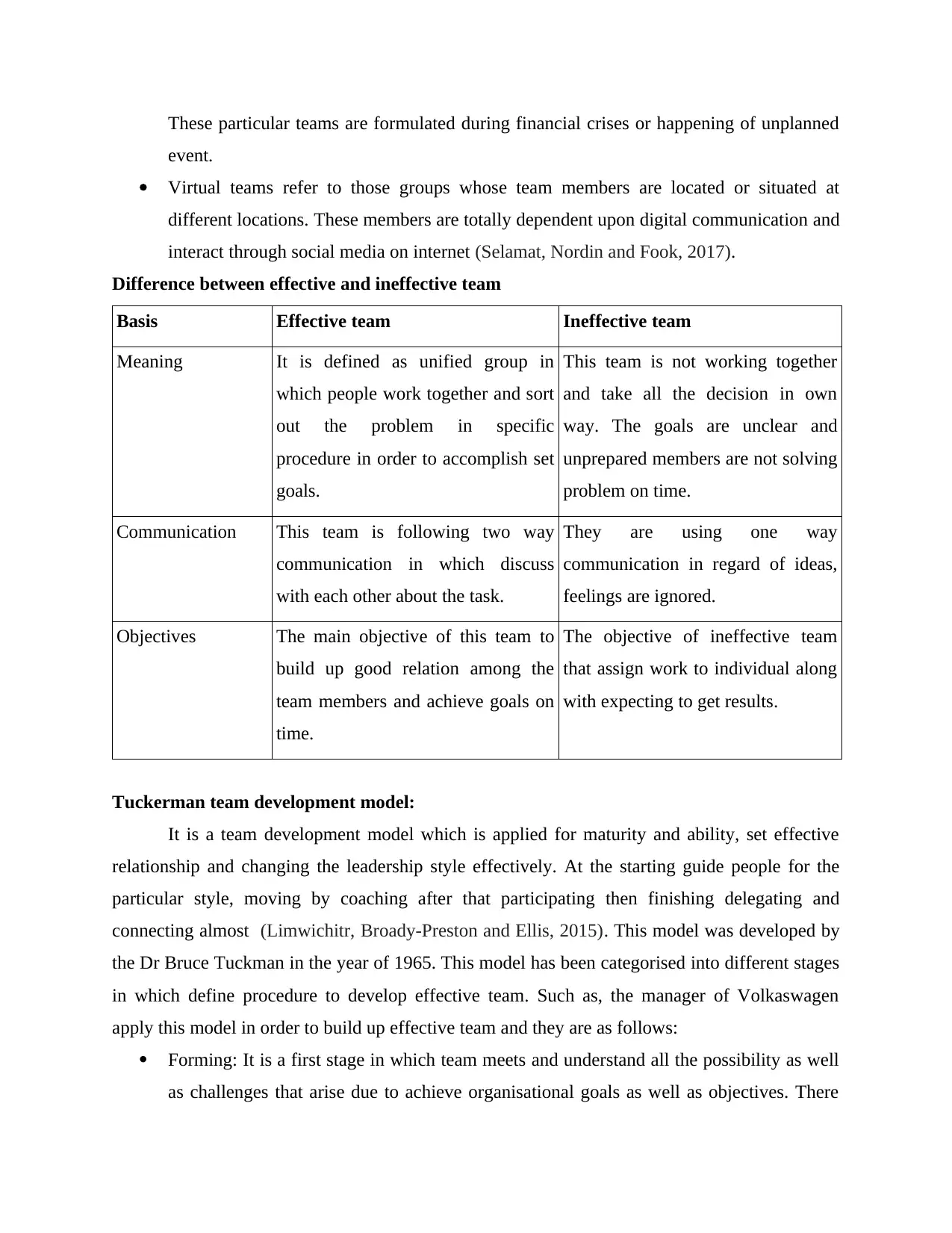
These particular teams are formulated during financial crises or happening of unplanned
event.
Virtual teams refer to those groups whose team members are located or situated at
different locations. These members are totally dependent upon digital communication and
interact through social media on internet (Selamat, Nordin and Fook, 2017).
Difference between effective and ineffective team
Basis Effective team Ineffective team
Meaning It is defined as unified group in
which people work together and sort
out the problem in specific
procedure in order to accomplish set
goals.
This team is not working together
and take all the decision in own
way. The goals are unclear and
unprepared members are not solving
problem on time.
Communication This team is following two way
communication in which discuss
with each other about the task.
They are using one way
communication in regard of ideas,
feelings are ignored.
Objectives The main objective of this team to
build up good relation among the
team members and achieve goals on
time.
The objective of ineffective team
that assign work to individual along
with expecting to get results.
Tuckerman team development model:
It is a team development model which is applied for maturity and ability, set effective
relationship and changing the leadership style effectively. At the starting guide people for the
particular style, moving by coaching after that participating then finishing delegating and
connecting almost (Limwichitr, Broady-Preston and Ellis, 2015). This model was developed by
the Dr Bruce Tuckman in the year of 1965. This model has been categorised into different stages
in which define procedure to develop effective team. Such as, the manager of Volkaswagen
apply this model in order to build up effective team and they are as follows:
Forming: It is a first stage in which team meets and understand all the possibility as well
as challenges that arise due to achieve organisational goals as well as objectives. There
event.
Virtual teams refer to those groups whose team members are located or situated at
different locations. These members are totally dependent upon digital communication and
interact through social media on internet (Selamat, Nordin and Fook, 2017).
Difference between effective and ineffective team
Basis Effective team Ineffective team
Meaning It is defined as unified group in
which people work together and sort
out the problem in specific
procedure in order to accomplish set
goals.
This team is not working together
and take all the decision in own
way. The goals are unclear and
unprepared members are not solving
problem on time.
Communication This team is following two way
communication in which discuss
with each other about the task.
They are using one way
communication in regard of ideas,
feelings are ignored.
Objectives The main objective of this team to
build up good relation among the
team members and achieve goals on
time.
The objective of ineffective team
that assign work to individual along
with expecting to get results.
Tuckerman team development model:
It is a team development model which is applied for maturity and ability, set effective
relationship and changing the leadership style effectively. At the starting guide people for the
particular style, moving by coaching after that participating then finishing delegating and
connecting almost (Limwichitr, Broady-Preston and Ellis, 2015). This model was developed by
the Dr Bruce Tuckman in the year of 1965. This model has been categorised into different stages
in which define procedure to develop effective team. Such as, the manager of Volkaswagen
apply this model in order to build up effective team and they are as follows:
Forming: It is a first stage in which team meets and understand all the possibility as well
as challenges that arise due to achieve organisational goals as well as objectives. There
Paraphrase This Document
Need a fresh take? Get an instant paraphrase of this document with our AI Paraphraser
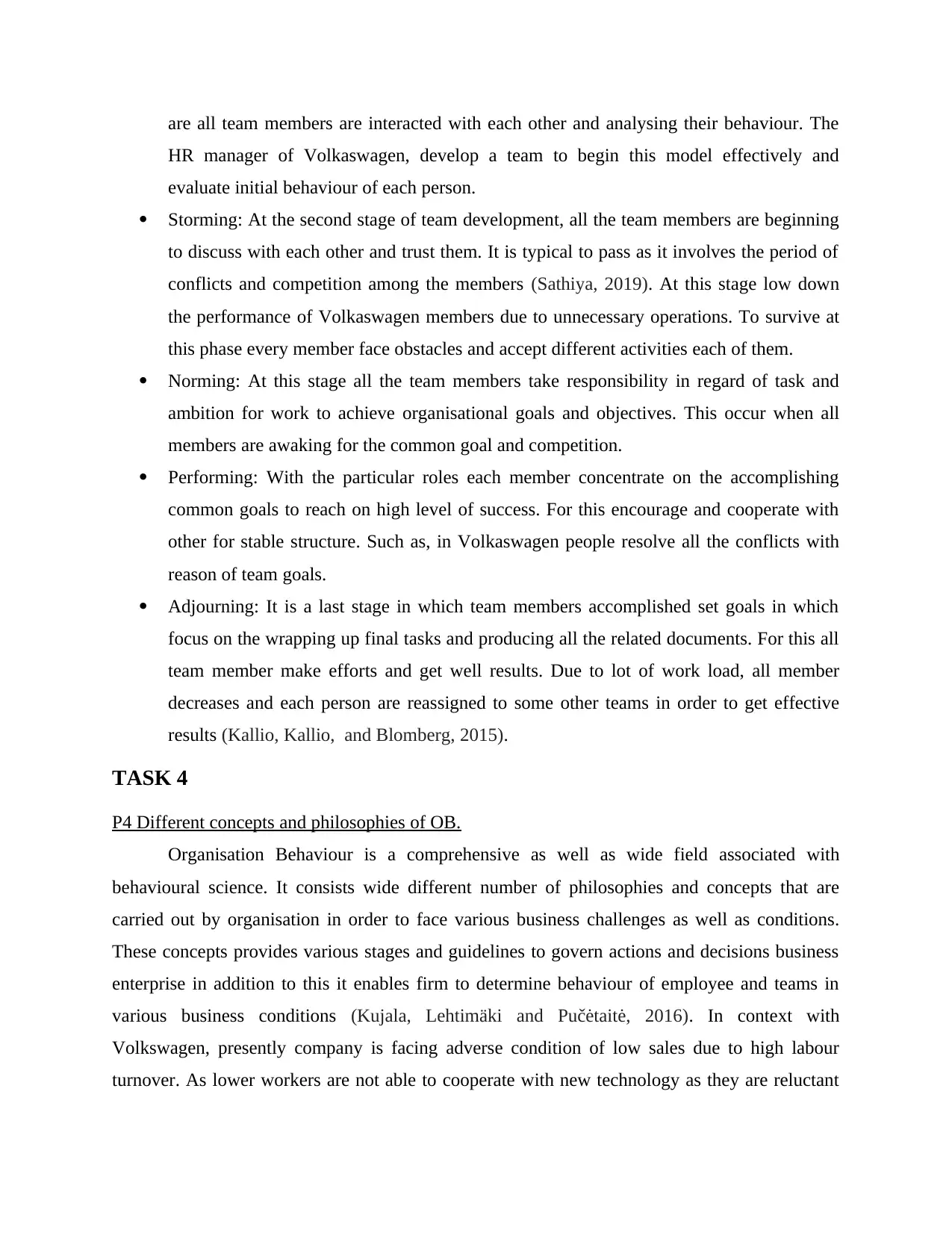
are all team members are interacted with each other and analysing their behaviour. The
HR manager of Volkaswagen, develop a team to begin this model effectively and
evaluate initial behaviour of each person.
Storming: At the second stage of team development, all the team members are beginning
to discuss with each other and trust them. It is typical to pass as it involves the period of
conflicts and competition among the members (Sathiya, 2019). At this stage low down
the performance of Volkaswagen members due to unnecessary operations. To survive at
this phase every member face obstacles and accept different activities each of them.
Norming: At this stage all the team members take responsibility in regard of task and
ambition for work to achieve organisational goals and objectives. This occur when all
members are awaking for the common goal and competition.
Performing: With the particular roles each member concentrate on the accomplishing
common goals to reach on high level of success. For this encourage and cooperate with
other for stable structure. Such as, in Volkaswagen people resolve all the conflicts with
reason of team goals.
Adjourning: It is a last stage in which team members accomplished set goals in which
focus on the wrapping up final tasks and producing all the related documents. For this all
team member make efforts and get well results. Due to lot of work load, all member
decreases and each person are reassigned to some other teams in order to get effective
results (Kallio, Kallio, and Blomberg, 2015).
TASK 4
P4 Different concepts and philosophies of OB.
Organisation Behaviour is a comprehensive as well as wide field associated with
behavioural science. It consists wide different number of philosophies and concepts that are
carried out by organisation in order to face various business challenges as well as conditions.
These concepts provides various stages and guidelines to govern actions and decisions business
enterprise in addition to this it enables firm to determine behaviour of employee and teams in
various business conditions (Kujala, Lehtimäki and Pučėtaitė, 2016). In context with
Volkswagen, presently company is facing adverse condition of low sales due to high labour
turnover. As lower workers are not able to cooperate with new technology as they are reluctant
HR manager of Volkaswagen, develop a team to begin this model effectively and
evaluate initial behaviour of each person.
Storming: At the second stage of team development, all the team members are beginning
to discuss with each other and trust them. It is typical to pass as it involves the period of
conflicts and competition among the members (Sathiya, 2019). At this stage low down
the performance of Volkaswagen members due to unnecessary operations. To survive at
this phase every member face obstacles and accept different activities each of them.
Norming: At this stage all the team members take responsibility in regard of task and
ambition for work to achieve organisational goals and objectives. This occur when all
members are awaking for the common goal and competition.
Performing: With the particular roles each member concentrate on the accomplishing
common goals to reach on high level of success. For this encourage and cooperate with
other for stable structure. Such as, in Volkaswagen people resolve all the conflicts with
reason of team goals.
Adjourning: It is a last stage in which team members accomplished set goals in which
focus on the wrapping up final tasks and producing all the related documents. For this all
team member make efforts and get well results. Due to lot of work load, all member
decreases and each person are reassigned to some other teams in order to get effective
results (Kallio, Kallio, and Blomberg, 2015).
TASK 4
P4 Different concepts and philosophies of OB.
Organisation Behaviour is a comprehensive as well as wide field associated with
behavioural science. It consists wide different number of philosophies and concepts that are
carried out by organisation in order to face various business challenges as well as conditions.
These concepts provides various stages and guidelines to govern actions and decisions business
enterprise in addition to this it enables firm to determine behaviour of employee and teams in
various business conditions (Kujala, Lehtimäki and Pučėtaitė, 2016). In context with
Volkswagen, presently company is facing adverse condition of low sales due to high labour
turnover. As lower workers are not able to cooperate with new technology as they are reluctant
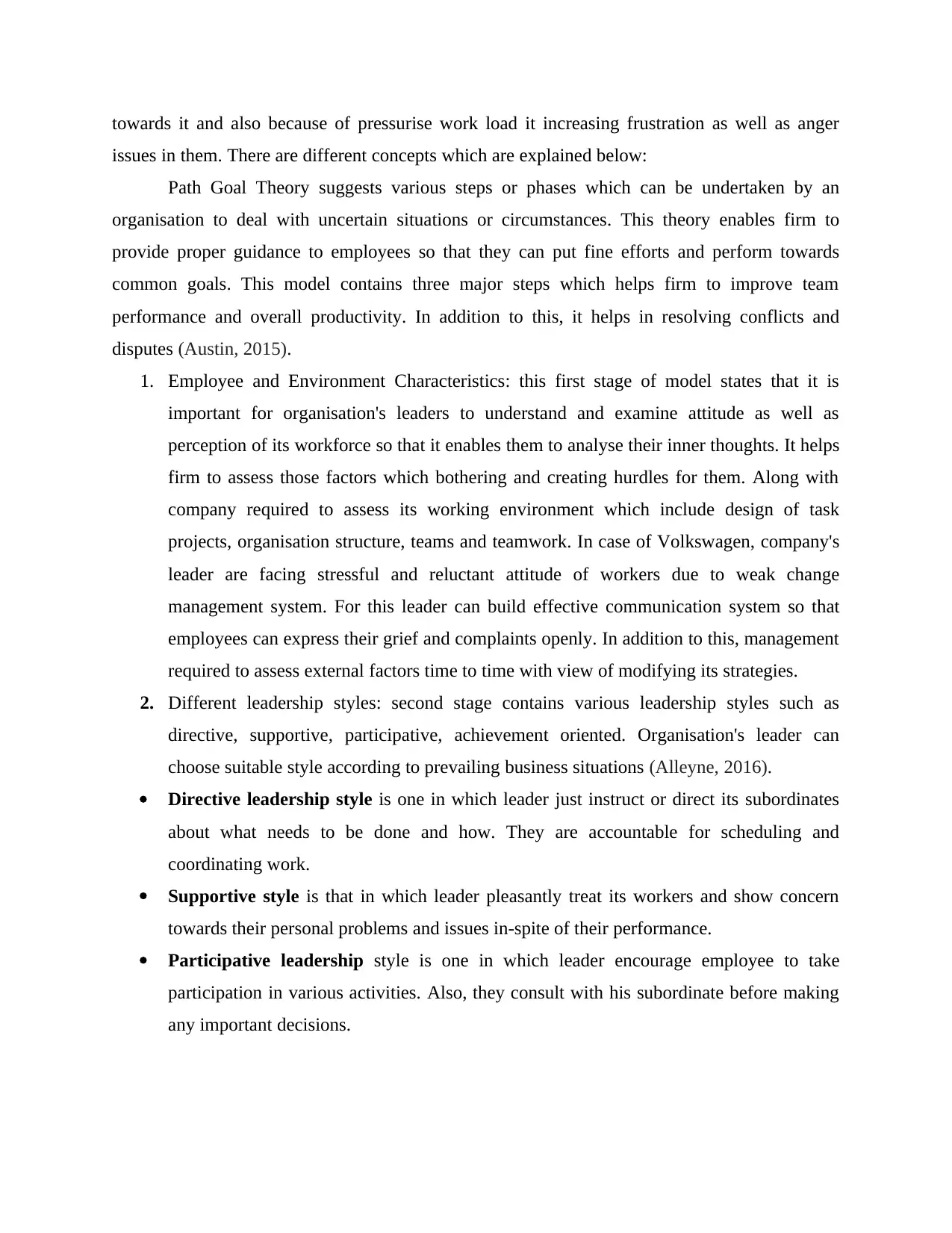
towards it and also because of pressurise work load it increasing frustration as well as anger
issues in them. There are different concepts which are explained below:
Path Goal Theory suggests various steps or phases which can be undertaken by an
organisation to deal with uncertain situations or circumstances. This theory enables firm to
provide proper guidance to employees so that they can put fine efforts and perform towards
common goals. This model contains three major steps which helps firm to improve team
performance and overall productivity. In addition to this, it helps in resolving conflicts and
disputes (Austin, 2015).
1. Employee and Environment Characteristics: this first stage of model states that it is
important for organisation's leaders to understand and examine attitude as well as
perception of its workforce so that it enables them to analyse their inner thoughts. It helps
firm to assess those factors which bothering and creating hurdles for them. Along with
company required to assess its working environment which include design of task
projects, organisation structure, teams and teamwork. In case of Volkswagen, company's
leader are facing stressful and reluctant attitude of workers due to weak change
management system. For this leader can build effective communication system so that
employees can express their grief and complaints openly. In addition to this, management
required to assess external factors time to time with view of modifying its strategies.
2. Different leadership styles: second stage contains various leadership styles such as
directive, supportive, participative, achievement oriented. Organisation's leader can
choose suitable style according to prevailing business situations (Alleyne, 2016).
Directive leadership style is one in which leader just instruct or direct its subordinates
about what needs to be done and how. They are accountable for scheduling and
coordinating work.
Supportive style is that in which leader pleasantly treat its workers and show concern
towards their personal problems and issues in-spite of their performance.
Participative leadership style is one in which leader encourage employee to take
participation in various activities. Also, they consult with his subordinate before making
any important decisions.
issues in them. There are different concepts which are explained below:
Path Goal Theory suggests various steps or phases which can be undertaken by an
organisation to deal with uncertain situations or circumstances. This theory enables firm to
provide proper guidance to employees so that they can put fine efforts and perform towards
common goals. This model contains three major steps which helps firm to improve team
performance and overall productivity. In addition to this, it helps in resolving conflicts and
disputes (Austin, 2015).
1. Employee and Environment Characteristics: this first stage of model states that it is
important for organisation's leaders to understand and examine attitude as well as
perception of its workforce so that it enables them to analyse their inner thoughts. It helps
firm to assess those factors which bothering and creating hurdles for them. Along with
company required to assess its working environment which include design of task
projects, organisation structure, teams and teamwork. In case of Volkswagen, company's
leader are facing stressful and reluctant attitude of workers due to weak change
management system. For this leader can build effective communication system so that
employees can express their grief and complaints openly. In addition to this, management
required to assess external factors time to time with view of modifying its strategies.
2. Different leadership styles: second stage contains various leadership styles such as
directive, supportive, participative, achievement oriented. Organisation's leader can
choose suitable style according to prevailing business situations (Alleyne, 2016).
Directive leadership style is one in which leader just instruct or direct its subordinates
about what needs to be done and how. They are accountable for scheduling and
coordinating work.
Supportive style is that in which leader pleasantly treat its workers and show concern
towards their personal problems and issues in-spite of their performance.
Participative leadership style is one in which leader encourage employee to take
participation in various activities. Also, they consult with his subordinate before making
any important decisions.
⊘ This is a preview!⊘
Do you want full access?
Subscribe today to unlock all pages.

Trusted by 1+ million students worldwide
1 out of 16
Related Documents
Your All-in-One AI-Powered Toolkit for Academic Success.
+13062052269
info@desklib.com
Available 24*7 on WhatsApp / Email
![[object Object]](/_next/static/media/star-bottom.7253800d.svg)
Unlock your academic potential
Copyright © 2020–2026 A2Z Services. All Rights Reserved. Developed and managed by ZUCOL.




